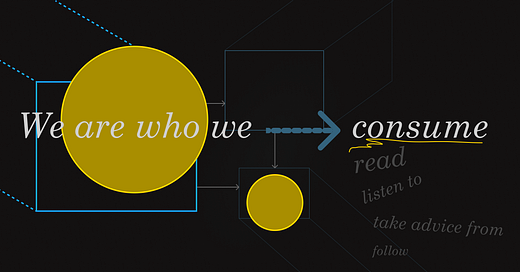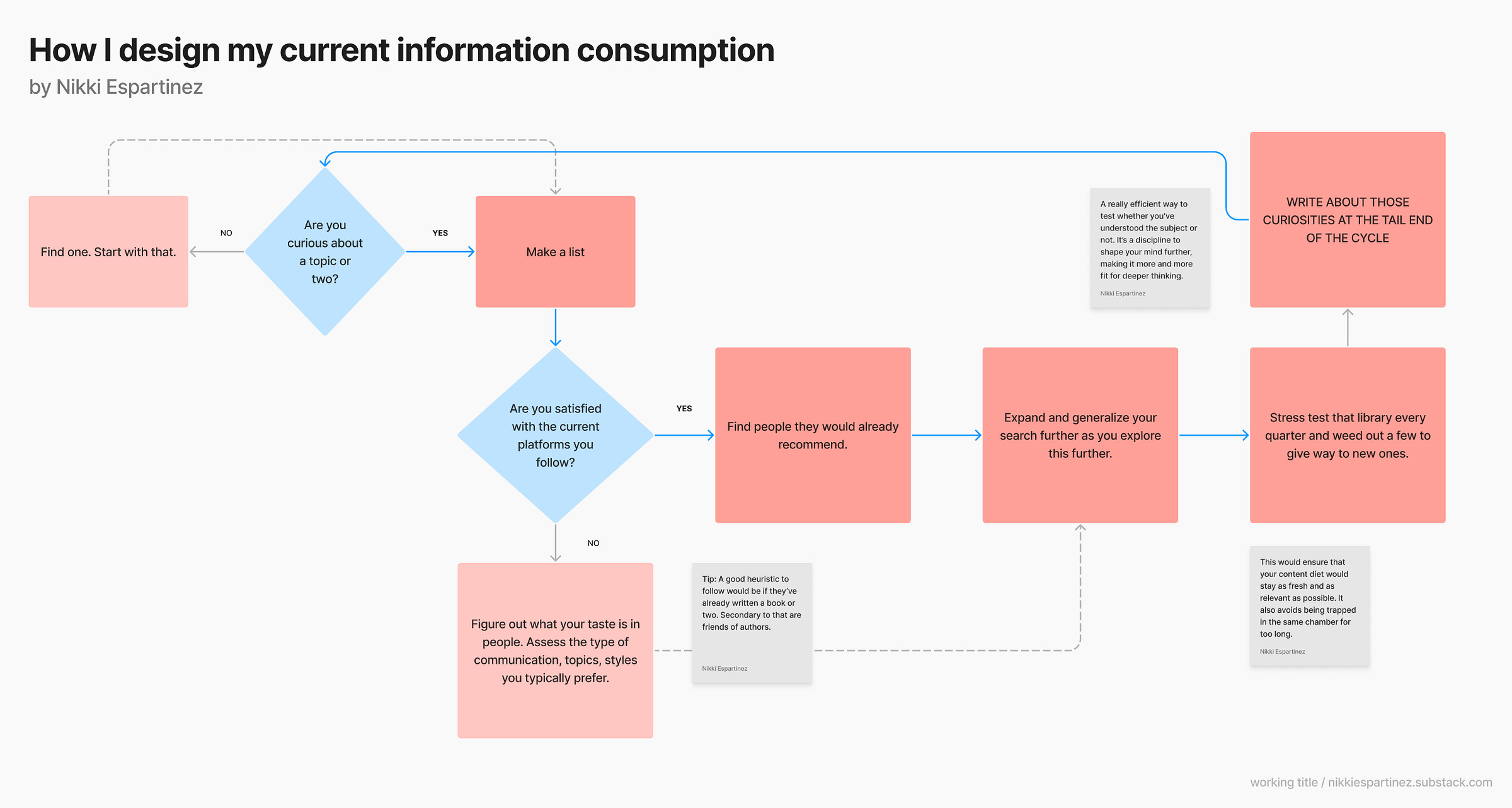#47: What My Content Diet Looks Like
On decision-making, filtering content, plus thoughts on opportunity costs
Just wanted to share this learning hack I’ve developed over the last few years. I have been quite obsessed with the idea of self-teaching, particularly using the internet. From online courses to bootcamps, books to podcast channels and a wide variety of other avenues, my hunger and thirst for learning just wouldn’t stop.
This commitment to learning independently is one of the best things I’ve ever done. It has also led me to a few incredible opportunities I never would’ve gotten otherwise. So, in true Nikki fashion, I’ve been feeling the need to pass everything I know forward and this post is one of those. Please enjoy!
How I design my current information consumption:
First, I make a list of all my curiosities.
What am I curious about today? What is that topic or an intersection of topics that I can’t stop constantly thinking about? Who are the people worth talking to and listening from for this? I either do a mental list of those or I simply write it down somewhere I can easily access. Right now, it’s my local Apple Notes. The important thing is to keep this list at a place that is easily accessible and is readily available to update anytime. Take as much friction out of discovery-driven tasks like this. It’ll be a lot easier to maintain this good habit (or any habit really) by eliminating the barriers to doing it.
Barriers are the silent killers of momentum. The best defense against them is to understand where they’re coming from. These days, there are a ton, even hundreds of choices for tools to use. I try not to get too overwhelmed by being fancy with it. Cloud-based word processors like Google Docs for multi-platform usage, Apple Notes for a convenient offline access, Figma for diagramming and for visual add-ons if necessary then my primary choice for publishing which is Substack.
Every tool I’ve mentioned here is completely free, and can work even on a low-medium computing processor. An iPhone and a chrome browser is all that it takes for this workflow to function and work.
Don’t get fancy.
Keep it simple, always.
For more of my thoughts on following one’s curiosities, please read this past post:
Next, I check my current library / inventory of sources.
Before I branch out and explore new platforms, I narrow it down to my current rotation. The reason for this is to maintain flow and consistency with my sources. The best recommendations would always come from what I currently have. If I’m already listening to a certain group of people, there’s a huge chance that they’ll lead me to that next one. Factoring taste, relevance and overall approach to communication, the probability of finding that next compatible voice will be quite high.
Of course, there would always be an exemption to this. It’s also a good idea to stress-test this method occasionally, that way, I can leave more room for surprises every once in a while and it weeds out stale platforms / voices over time. I would highly recommend doing so on a quarterly basis, at least.
Remember, in choosing the type of content / voice you listen to and consume, you say NO to a dozen others. Pick extremely wisely. You’re only paying with your time, after-all.
Related reads:
Then, I also read a lot of books.
Books are an easy filter to this. In a recent interview, author, entrepreneur, musician and TedTalk speaker Derek Sivers said something like “If it’s important enough, it will make it into a book.” In a lot of ways, he is right. It’s easy to publish a lot of opinionated pieces online with just a push of a button or two. It’s also just as easy to get lost in an oversaturated market like a social newsfeed. The trick is to pick out which people and topics are worth your precious time, attention and eyeballs.
Books have a way of signaling that. It’s a lot more tedious to produce, the gratification is nowhere near instant, the investment is a lot higher and so is the ROI. People who’ve written books are typically worth more in terms of intellectual capital. There is no question about this.
“…anyone with a smartphone and an internet connection can start a podcast. But when he tells people he is an author, their focus narrows and their voice gets quiet and the whole color of the room changes. Hence why so many people, whether they actually enjoy writing or not (or have anything valuable to say) want to publish a book at some point in their lives. Saying you are an author is special.” - from fellow substack creator, Category Pirates, [Part I] How To Become A Top 444 Author: How To Turn Your Breakthrough Ideas Into A Best-Selling Book (According To The World’s First Non-Fiction Study)
So when I’m trying to find a voice or two to listen to for a specific curiosity, almost always, I look for authors, or friends of authors.
I have yet to be disappointed with my choices so far.
And then finally, I diversify and generalize my search.
I’m rarely interested in just one topic. It’s even rare for that topic to be on the specialized side of things. It’s oftentimes general, more breadth than depth. It is certainly true for when I’m just starting out on a specific topic.
Blame my impatience or maybe even short-term thinking but also because I prefer to be smarter with the risks I’m taking. In this case, for every topic I say YES to and dedicate a portion of life / brain energy to, I’m saying NO to 99% of everything else. No, it’s not an easy trade off to make every time.
I want to make sure I’m really interested in a thing first before deep diving into it. The overall purpose has to be loud and clear and the value has to be worth it. This, without wasting a lot of time because once again, time is the ultimate currency. I’d really rather waste as little of it as possible.
Right now, I’m really enjoying the following intersection of topics:
Parenting + work-life balance vs work-life integration
People I follow on this: James Altucher, Shane Parrish
Remote work + effects to children
Balancing relationships + individual creative pursuits + designing careers
People I follow on this: Sahil Bloom, Susan Cain, Katie Dill
Content-based entrepreneurial pursuits + modern internet tools + financial freedom
People I follow on this: Polina Pompliano, Sahil Lavingia, Andrew Wilkinson, Annie Duke
I can probably think of a dozen more topics but they’re unlikely to be high on my priorities these days.
Related reads:
To sum this all up…
If the image is not clear enough, please find the original diagram here. It’s a FigJam link, if you’re not familiar with this tool, it is essentially a white boarding app from Figma. Leave some feedback if you can about how I can make this experience so much better for you. :)
Some thoughts on decisions and opportunity costs
There’s a logical and practical argument to being better at designing one’s information consumption. It’s an essential and, arguably even, a highly critical skill for modern day living. Nobody wakes up every morning and says, “I want to waste more of my time, money and energy today”, or at least, I should hope so. Most of us want the same thing which is the freedom to do more of what makes us happy, productive and fulfilled people.
Unfortunately, that remains a pipe dream until we actually take the small but significant steps to making that happen every day until it manifests into reality. I strongly believe that starts with taking a closer look at where we invest our time, energy and money on a daily basis. Designing one’s information consumption is just a piece of that complex puzzle.
We are who we:
Listen and pay attention to
Read books and articles from
Consume and digest information from
Follow advice from
Talk to and exchange ideas with constantly
Hang out with regularly, virtually and in-person
To say that we need to take these decisions cautiously is an understatement. We need to be just as protective with who we let inside our heads as who we let inside our bank accounts, homes and all the other assets we own. It’ll influence our futures more than we give it credit for.
“Any choice that you make has associated opportunity cost. When you choose an option, you’re also rejecting other options, along with the upside potential of those things you chose not to do. The greater the gains associated with the options you don’t pick, the higher the opportunity cost. The higher the opportunity cost, the greater the penalty for going fast.” - Annie Duke, “How to Decide: Simple Tools for Making Better Choices”
I really couldn’t agree more. Fantastic book, by the way. I would recommend it to just about anyone who is serious about improving their decision-making skills.
For my review of Annie’s first book, “Thinking in Bets: Making Smarter Decisions When You Don’t Have All the Facts” and other similar titles, please do check out my past post about it:
Thank you for reading,
Nikki Espartinez
THANK YOU for reading Working Title. I am here because of you. I’d love to hear more about what you think or why you signed up. Please send me a note if you have any feedback at all: nikkiespartinez@gmail.com
Thanks for reading Working Title! Subscribe for free to receive new posts and support my work.
✨ Working Title is free, and always will be. ✨
If you think someone can benefit from my writing, please do share my little newsletter this side of the internet. I really appreciate the recommendation!






